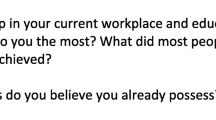Abstract
In rapidly growing Asian economies, the need to recruit and train additional leadership talent is particularly problematic, as the demand for talent continues to outstrip available indigenous human capital. Yet most leadership development research to date has focused on US samples. The current study extends our knowledge about how managers develop as leaders by analyzing and comparing qualitative data on key developmental events and lessons from senior executives in China and India, and including a comparison to similar recent US data.
Similar content being viewed by others
References
Baltes, P. and Staudinger, U. (1999) Lifespan psychology: Theory and application to intellectual functioning. Annual Review of Psychology 50 (1): 471–508.
Bell, A. (2006) Leadership Development in Asia-Pacific: Identifying and Developing Leaders for Growth. New York: Conference Board. Research Working Group Report.
Day, D., Harrison, M. and Halpin, S. (2009) An Integrative Approach to Leader Development: Connecting Adult Development, Identity, and Expertise. New York: Taylor & Francis.
Douglas, C. (2003) Key Events and Lessons for Managers in a Diverse Workforce. Greensboro, NC: Center for Creative Leadership.
Flanagan, J. (1954) The critical incident technique. Psychological Bulletin 51 (4): 327–358.
Greenlee, J.C. (2008) Lessons of experience for community college leaders. Doctoral dissertation, North Carolina Agricultural and Technical State University, Greensboro, NC.
Haghirian, P. (2008) Understanding Japanese Management Practices. New York: Business Expert Press, LLC.
Hou, W.C. (2010) Developing Asia’s corporate leadership: Challenges and moving forward. In D. Ulrich (ed.) Leadership in Asia. New York: McGraw-Hill, pp 40–52.
House, R.J., Hanges, P.M., Javidan, M., Dorfman, P. and Gupta, V. (2004) Culture, Leadership and Organizations: The GLOBE Study of 62 Societies. Thousand Oaks, CA: Sage.
Huang, D. (2010) Leadership in China: Challenges and practice. In D. Dotlitch, P. Cairo, S. Rhinsmith and R. Meeks (eds.) The 2010 Pfeiffer Annual: Leadership Development. San Francisco, CA: John Wiley and Sons, pp 59–71.
IBM Global Business Services. (2008) Unlocking the DNA of the Adaptable Workforce: The Global Human Capital Study 2008. Armonk, NY: IBM.
Lam, L., Huang, X. and Lau, D. (2012) Leadership research in Asia: Taking the road less traveled? Asia Pacific Journal of Management 29: 195–204.
Leung, K. (2012) Indigenous Chinese management research: Like it or not, we need it. Management and Organization Review 8 (1): 1–5.
Li, P., Leung, K., Chen, C. and Luo, J. (2012) Indigenous research on Chinese management: What and how. Management and Organization Review 8 (1): 7–24.
Lit, L. (2010) Leadership challenges in the transformation of healthcare. In D. Ulrich (ed.) Leadership in Asia. New York: McGraw-Hill, pp 181–197.
Lohr, S. (1982) How job rotation works for Japanese. New York Times 12 July, Section D, p. 1, http://www.nytimes.com/1982/07/12/business/how-job-rotation-works-for-japanese.html, accessed 23 January 2013.
Lyness, K., Eckert, R., Sywulak, L., Ruderman, M. and Gentry, W. (2012) Culture and managerial careers: A study in five European countries. Paper presented at Society for Industrial and Organizational Psychology Annual Meeting, 26–28 April, San Diego, CA.
McCall, M. and Hollenbeck, G. (2002) Developing Global Executives: The Lessons of International Experience. Boston, MA: Harvard Business School Press.
McCall, M., Lombardo, M. and Morrison, A. (1988) The Lessons of Experience: How Successful Executives Develop on the Job. Lexington, KY: Lexington Books.
McCauley, C., Kanaga, K. and Lafferty, K. (2010a) Leader development systems. In E. Van Velsor, C. McCauley and M. Ruderman (eds.) The Center for Creative Leadership Handbook of Leadership Development. 3rd edn. San Francisco, CA: Jossey-Bass, pp 29–62.
McCauley, C., Van Velsor, E. and Ruderman, M. (eds.) (2010b) Introduction: Our view of leadership development. In: The Center for Creative Leadership Handbook of Leadership Development 3rd edn. San Francisco, CA: Jossey-Bass, pp 1–28.
Morrison, A., White, R. and Van Velsor, E. (1987, 1991) Breaking the Glass Ceiling: Can Women Make it to the Top of America’s Biggest Corporations? Reading, MA: Addison Wesley.
Moxley, R. and Pulley, M. (2004) Learning from hardships. In C. McCauley and E. Van Velsor (eds.) The Center for Creative Leadership Handbook of Leadership Development. 2nd edn. San Francisco, CA: Jossey-Bass, pp 183–203.
Palrecha, R., Spangler, W. and Yammarino, F. (2012) A comparative study of three leadership approaches in India. Leadership Quarterly 23 (1): 146–162.
Pande, G. (2010) Leadership challenges, opportunities and strategies for new Asia: The TCS approach. In D. Ulrich (ed.) Leadership in Asia. New York: McGraw-Hill, pp 211–227.
Schneider, S.C. and Barsoux, J.-L. (2003) Managing Across Cultures. Upper Saddle River, NJ: Prentice Hall.
Shipper, F., Hoffman, R. and Rotondo, D. (2007) Does the 360 feedback process create actionable knowledge equally across cultures? Academy of Management Learning and Education 6 (1): 33–50.
Shyamsunder, A., Anand, S., Punj, A. and Shatdal, A. (2011) Leadership development in organizations in India: The why and how of it (Parts 1 and 2). Vikalpa 36 3 (4): 61–132.
Sinha, J. (1995) The Cultural Context of Leadership and Power. New Delhi: Sage.
Smith, P. (2010) The right leaders in place in Asia: The right future leaders in the pipeline. In D. Ulrich (ed.) Leadership in Asia. New York: McGraw-Hill, pp 130–152.
Van Velsor, E. and Hughes, M. (1991) Gender Differences in the Development of Managers. Greensboro, NC: Center for Creative Leadership.
Van Velsor, E., Criswell, C., Puryear, K. and Hollenbeck, N. (2011) Learning Leadership in the Military: Key Developmental Events and Lessons from Senior Military Officers. Greensboro, NC: Center for Creative Leadership.
Whetten, D. (2009) An examination of the interface between context and theory applied to the study of Chinese organizations. Management and Organization Review 5 (1): 29–55.
Williamson, C. (2010) Paradigm shift: From law enforcement management to law enforcement leadership. PhD dissertation, North Carolina Agricultural and Technical State University, Greensboro.
Wilson, M. (2008) Developing Future Leaders For High-Growth Indian Companies: New Perspectives, White Paper Greensboro, NC: Center for Creative Leadership.
Wilson, M. (2010) Developing Tomorrow’s Leaders Today: Insights from Corporate India. Singapore: Wiley and Sons (Asia).
Works Institute Recruit Company. (2001) The Lessons of Experience in Japan: Research Report. Tokyo: Work Institute Recruit.
Wright, P. (2010) Global leadership practices among large multinational companies: How Asia compares. In D. Ulrich (ed.) Leadership in Asia. New York: McGraw-Hill, pp 81–107.
Zhang, Y., Chandrasekar, A. and Wei, R. (2009) Developing Chinese Leaders in the 21st Century, White Paper Greensboro, NC: Center for Creative Leadership.
Zhang, X. et al. (2012) Understanding indigenous leadership research: Explication and Chinese examples. Leadership Quarterly 23 (6): 1063–1079.
Acknowledgements
The Center for Creative Leadership gratefully acknowledges the Singapore Economic Development Board for their support of the China and India studies reported this article.
Author information
Authors and Affiliations
Rights and permissions
About this article
Cite this article
Van Velsor, E., Wilson, M., Criswell, C. et al. Learning to lead: A comparison of developmental events and learning among managers in China, India and the United States. Asian Bus Manage 12, 455–476 (2013). https://doi.org/10.1057/abm.2013.9
Received:
Revised:
Accepted:
Published:
Issue Date:
DOI: https://doi.org/10.1057/abm.2013.9




